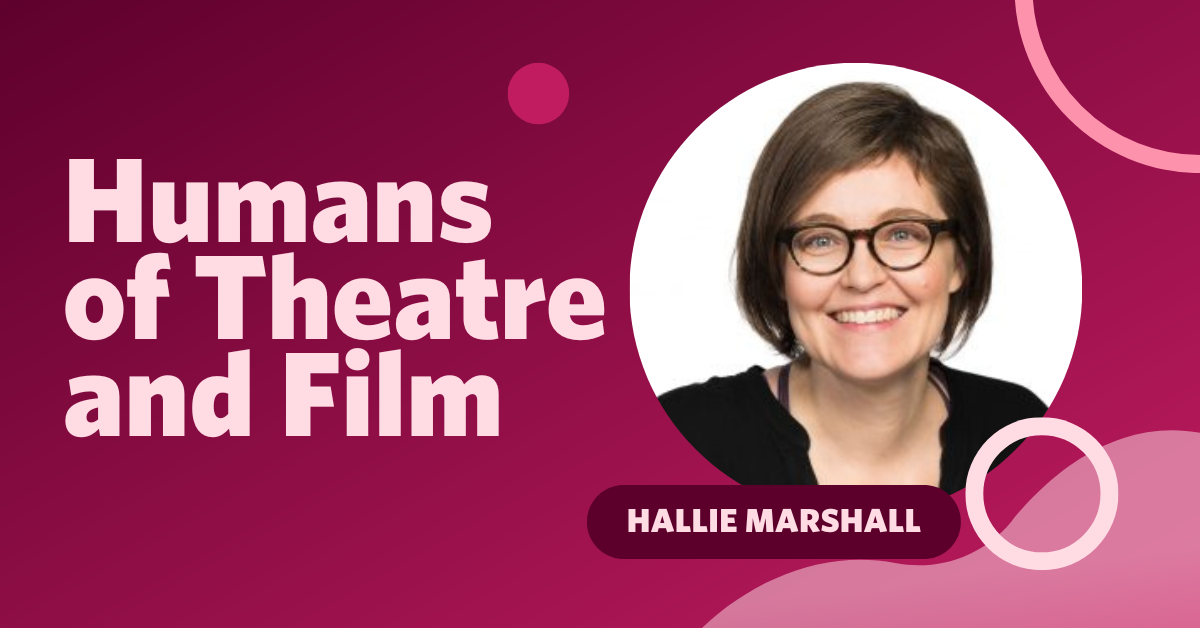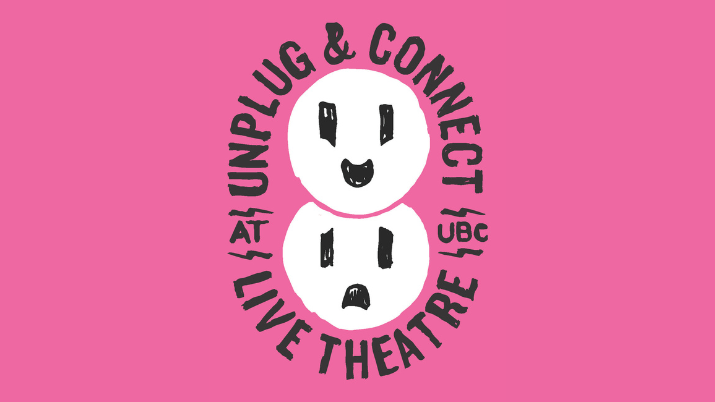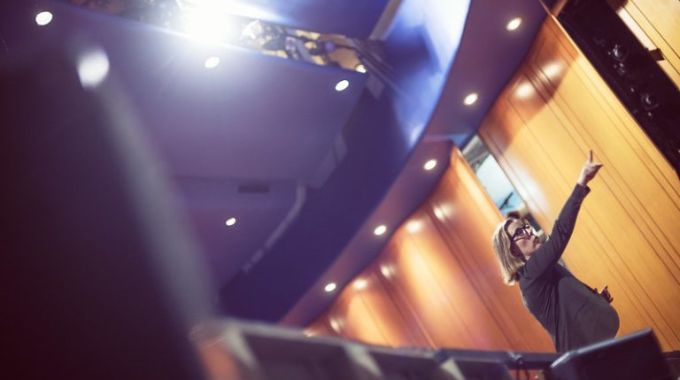

When many of us think of theatre and film, we envision showtime!, action!, and “to be or not to be!” While these fields are undeniably action-packed and creative, they encompass so much more. They’re about crafting and studying whole worlds. Theorizing and analyzing all those intricate moving parts that build experiences. Delighting audiences and inspiring them to reflect upon their own assumptions of what it means to be human.
The Department of Theatre and Film at UBC is home to a diverse group of passionate and talented faculty, staff, and students, who specialize in a wide range of theories, practices, genres, and methods. We are excited to introduce you to one of the humans that make up our department, Hallie Marshall, Associate Professor in Theatre Studies. Hallie shares about the importance of fostering community, her interest in ancient Greek theatre, and her rewatching of Avatar: The Last Airbender!
How did you know academia was for you?
If anyone had asked me when I started university where I would end up, I would never have answered “academia” — though I might have answered “teacher”, following in the footsteps of my mother. I grew up on a farm outside a very small town in northeastern British Columbia. In a world before the internet, in a house that didn’t have access to cable television, my knowledge of the world and its possibilities was limited. University slowly opened doors and possibilities and gave me space to find my passion. Tuition was more affordable then, which gave me the luxury of being able to take courses because they looked interesting, not because they would fulfill degree requirements. I fell in love with Classics through a first-year Latin course and did an Honours degree in Latin and Classical Studies. Reading a particular book (Margalit Finkelberg’s The Birth of Literary Fiction) in my 4th-year made me think that I wanted to pursue graduate studies, so I did an MA in Classics, and from there a PhD in Comparative Literature. I specialized in Theatre and Classical Reception, looking at how and why ancient Greek theatre gets reused and re-performed in later periods, particularly in England from the early modern period to the late 20th century. Then, I was lucky enough to get a permanent job in academia, which lets me combine my love for my research and my passion for teaching.
Tell us about a project you are currently working on.
I am putting together another collaboration with Barefaced Greek to make a short film of Pindar’s Olympian 10, a poem written to celebrate a victory by a teenager named Hagesidamus in the boys’ boxing event at the Olympic Games of 476 BCE. Pindar specialized in writing choral victory hymns for the winners in athletic contests such as the Olympics. Victors (or their patrons) would hire poets to praise their successes, celebrating athletic excellence and granting a form of glory through poetry and performance that would last beyond the athletic contest, and perhaps beyond the life of the athlete.
What advice do you have for undergrad students?
Try to enjoy this time—for many of you, it is the only period in your life where it will just be about you. I know that the pressures that students are facing make this hard; from the financial impossibilities of living costs in Vancouver, which includes the challenges of finding decent, affordable housing, to the need for many students to work while attending university. And, of course, the existential fears about the future, from climate change to the rise of AI. Despite these challenges, try to find ways to focus on the here and now, and make the most of this time in your life. If you can afford it, take a course that has nothing to do with your degree, but just because it looks really interesting to you. Go talk to the lovely, helpful people at Go Global about taking a seminar abroad or doing a semester abroad, or even a full year exchange— many financial supports are available. Experiencing another part of the world beyond the superficial tourist experience can change your understanding of yourself and your place in the world. And no matter whether you are at UBC or abroad, try to limit your time online and go out and participate in activities that will let you engage with other students — join clubs, go to social events, find spaces on campus that foster a sense of community. I hear from a lot of students how lonely they find their time at UBC — building community takes a lot of time and effort, but it is absolutely worth it. Your time at UBC is not just about getting a degree, it is about have time and space to explore who you are and who you want to be. What you study is part of that, but the friends that you make and the experiences that you have are equally important.
Which courses do you teach?
The courses that I teach are centred on Western Theatre History.
At the 1st/2nd year level, I teach THTR 210, which is an introduction to dramatic literature that covers material from the ancient Greeks (400s BCE) through to the English Restoration (late 1600s-1700s). We focus on how dramatic literature is different than other literary forms, particularly because of its relationship to performance, the nature of the theatre and performance traditions in the different periods that we cover, as well as the political, social, and cultural contexts in which the plays we are reading were written and how these are reflected in the plays.
At the 3rd/4th year level, I teach THTR 320 and THTR 420 in alternating years. They are more advanced courses in Theatre History with THTR 320 covering material up to the 1800s, and THTR 420 covering modern theatre—from the late 1800s to the present. These courses give students the opportunity to delve deeper into material and ideas that are introduced in THTR 210 and THTR 211, as well as letting them pursue individualized research topics.
The 4th-year seminars and graduate courses that I teach are rooted in my own research areas. I often teach courses on reception, how and why works from earlier periods get reused by later playwrights in new contexts, and the history of the book. This fall term I am teaching a graduate course on the history of theatrical texts, which will cover material from the plays of the ancient Greeks written by hand on papyrus to modern digital editions, with part of the course devoted to the class creating their own digital edition of an early 17th-century play by Thomas Heywood.
And from time to time, I lead the Go Global Greece program which takes students to various locations in Greece over the course of about three weeks, thinking about the relationship between poetry and place. When funding permits, as part of that course we make short films of choral odes from ancient Greek tragedies.
What is your favourite place on campus?
I love the Rose Garden. The view from there captures all the natural beauty of Vancouver—the mountains, the sea, the forests. Even on rainy days it is beautiful, but on clear, sunny days it is stunning. The Museum of Anthropology is also extraordinary (and admission is free with your UBC Student Card). All of us who work and study on the traditional, ancestral, and unceded land of the Musqueam people have an obligation to learn about this land and its people. MOA is a great place to start. Its stunning collections showcase the history of British Columbia and its First Nations peoples, as well as other cultural communities. The Museum of Anthropology is home to some of the most beautiful art that I have ever seen, and we are so lucky to have this amazing museum on campus, and to have free access to it. I would encourage students to make a habit of just popping in for short visits—you don’t need to see the whole museum in a single visit. Explore it slowly, find objects that you love, learn about those objects and the people who made them.
What is your favourite way to relax?
Sitting in the sun with a good book and a nice drink.
Is there a favourite movie/tv show/book you’ve enjoyed lately?
My family and I are currently rewatching Avatar: The Last Airbender together. It is a beautiful story of the power of friendship and the importance of hope in the face of darkness. And it is very unusual, as a North American produced show targeted at children, in its willingness to not only acknowledge how dark and terrifying the world can be, but to really grapple with war, death, morality, and the challenges of balancing our sense of self with the expectations of others. It is filled with moral complexity and worth watching at any age—my husband and I love it, my 24 year-old son loves it, and my 7 year-old son loves it.
There have been two books that I have particularly enjoyed lately. Pip William’s novel The Dictionary of Lost Words is a fictionalized story centred around the creation of The Oxford English Dictionary. It captures the extraordinary feat that was the creation of the OED, while also making clear what was lost in this codification of the English language, especially words used by women and the lower classes which were unlikely to have appeared in published works (a prerequisite for inclusion). The book begins when the central character is a girl sitting under the table as her father and his colleagues work on gathering and defining words, then follows her from 1886 to 1828, showing the ways in which lives in this period were constrained by gender and class.
I also really loved Carlo Rovelli’s The Order of Time. Because of my work on classical reception and how and why art engages with the past, I am interested in questions about the nature of time itself. We all experience the arrow of time (time only seems to go in a forward direction) but science struggles to explain why, or if time even really exists. Rovelli is an Italian theoretical physicist who is able to present complex ideas in ways that are accessible to the non-specialist reader. But I liked the book not just because it made ideas about the physics of time accessible, but because woven throughout is a beautiful meditation on time and being human. Each chapter begins with a passage of poetry from the ancient Roman poet Horace that captures something profound of our experience of time, and the book ends with a chapter not about the physics of time but rather a meditation on life and death. There is something beautiful about a scientist who is writing about the likelihood that time as we experience it doesn’t actually exist (but is instead a feature of how we perceive the world) framing that argument with passages that reinforce how important our perception of time is to our experience of being human.


